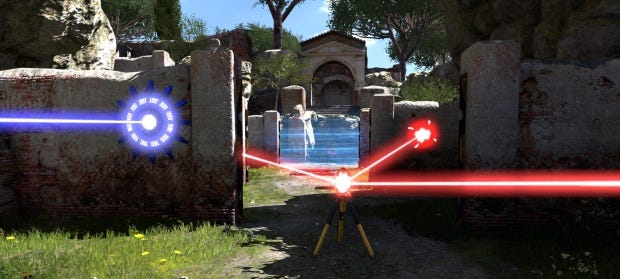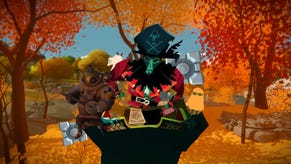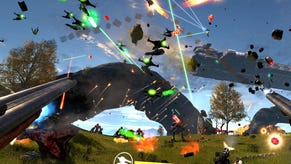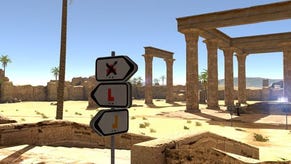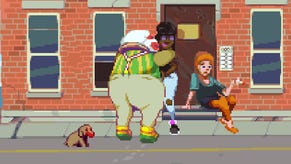Hands On: The Talos Principle
Ontoludology
The Talos Principle is a very clever, very calm creation. Which is a surprising new direction from Croteam, who have previously given us the splendid madcap frenzy of Serious Sam shooters. While clearly sharing the same fast-paced twitchy controls of the Serious Engine, and a similar design ethic of ruined civilisations, beyond this Talos is dramatically different. It’s a captivating first-person puzzle game, more influenced by Portal than Doom, with an intricate back-story questioning the nature of consciousness and personhood told through fascinating interactions with an AI. I've had a play of its first, extensive chapter.
The puzzles, at least in the earlier stages I’ve played through in some near-complete preview code, consist of familiar concepts played out in an unfamiliar way. Each level, played in first-person, takes place in the larger context of a sprawling world of ruins, with you seeking goals of floating puzzle pieces – Tetris-like blocks used to open access to new areas. To achieve this, at first you negotiate your way around fizzing blue barriers and combative drones (you don’t fight back – this is all about the puzzling), intuiting the correct placing of “jammers” to find pathways.
Soon “connectors” appear, which let you redirect coloured beams to locks that open barriers, which combined with jammers allow things to become far more elaborate. Blocks become a factor too, with a rather Portal-esque gag of calling them Hexahedrons, with more elements to appear as the game progresses.
None of it is anything we haven’t seen before, although more likely from a top-down perspective, but it’s all implemented superbly well. Puzzles range from pleasingly intuitive to brain-scrambling, and the nippiness of the Serious Engine, while always taking some getting used to after playing anything else, quickly becomes a boon to rapid dashing about as inspiration strikes.
This decent puzzle game wouldn't stand out as much during these early stages if it weren’t for the writing. There are few writers in this industry whose work I can spot without noticing their credit, but Tom Jubert is an exception. I had no doubt his fingers were in part responsible for a deeply sophisticated exploration of metaphysics and intelligence. Here he’s co-writing with Jonas Kyratzes, and the result is refreshing and interesting.
From the start you are directed by an omnipotent voice, explaining the world, and suggesting that if you’re able to complete the puzzles he says he’s crafted, then he will reveal to you the secrets of eternal life. Hmmmm. Soon after you find a clunky old computer terminal, stood on some sort of pedestal, that asks you to take a personality test – specifically, a test to see if you have a personality, if you are a person. A question that becomes more pertinent when you notice that your fingers on the keyboard of the computer look particularly robotic.
Consoles are found about the games’ zones, which offer fragments of writings, emails, comments threads, essays, and so on, seeming to be part of the fractured remains of an “Archive” of as-yet unrevealed purposes. And while, yes, that does mean this is another game that tells a large chunk of its story through a slight variant on scattered diary pages, I’ve rarely found it as effective and worth reading as what I’ve played so far. Discussions between researchers into the complexities of metaphysics feel human and engrossing, while more personal bits of writing, and academic literature on ontological philosophy over the last few thousand years, flesh out a story that’s entirely yours to piece together.
And yes, the fact that within this highbrow musing you’re being asked to collect giant floating puzzle pieces from contrived challenges is very much a conscious part of this tale. It has its cake and eats it, and knows it’s delicious.
I also have to note just how amazing the Serious Engine looks here. Glances can appear photorealistic, and its crisp, clean edges and luscious skies and scenery are often outstanding. Along with subtle and smart use of sound (chirping crickets is an oddly effective way of providing a more realistic ambience), as well as the joyful “BEEP BOOP!” of the terminals when they want to talk to you, there’s a lovely sense of place here, beyond what you’d expect in what might otherwise feel a contrived puzzle game.
Most outstanding so far, however, is how well those contrivances are played. Not only are the puzzles quickly smart and tough (they perhaps take a little too long to get properly tricky), but their context is splendidly justified in an intriguing narrative.
Having only played the first segment of at least four (it rather disguises in which direction things are heading) I obviously can’t make a call on how well it will all play out. But of what I’ve played so far, this looks like it could be pretty special. I hope it can sustain it.
